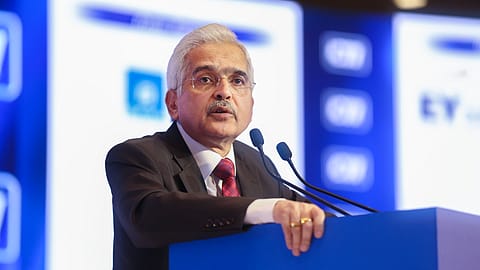India has navigated 'global turbulence' with resilience: RBI Governor
Shaktikanta Das highlights India's robust macro fundamentals, stable financial system, and digital innovation as key drivers of economic resilience amid global shocks

RBI Governor Shaktikanta Das, during an event in Mumbai today, said the global economy has gone through a period of "continual and unprecedented" shocks and that sailing through this turbulent period has been a "daunting challenge" for every country, including India.
He, however, said the Indian economy has sailed well through the prolonged period of turbulence and has exhibited resilience in the face of constantly emerging new challenges.
Speaking on the theme "Speaking on ‘Sailing through Turbulence: India’s Tryst with Financial Stability" at CNBC-TV18 Global Leadership Summit, Das said India’s economic growth remains resilient; inflation is expected to moderate despite periodic humps; and the external sector is robust.
According to the International Monetary Fund (IMF), the global growth will remain "stable yet underwhelming". In October 2024, the IMF maintained the global growth forecast at 3.2% in 2024 and 2025, saying risks to the global outlook are tilted to the "downside" amid elevated policy uncertainty.
Das, meanwhile, said the Reserve Bank has also played a "crucial" role in creating an enabling ecosystem for innovations in the payment systems in India. He said the RBI's focus has been to maintain financial stability, which breeds growth and prosperity.
"Introduction of 24x7 NEFT and RTGS; 10 the success of the Unified Payments Interface (UPI); and implementation of the central bank digital currency (CBDC) pilot project (e₹) are transforming the wider financial system," says Das.
The RBI governor said the Indian economy is sailing through smoothly, powered by buffers like strong macro-economic fundamentals, a stable financial system and a resilient external sector. "Our endeavour has been to seize every opportunity to further strengthen our fundamentals through prudent and proactive policy approach."
Recommended Stories
He said the digitalisation of banking services has received a further boost from the Reserve Bank’s pilot, the Unified Lending Interface (ULI), which has been designed and developed by the Reserve Bank Innovation Hub (RBIH), Bengaluru.
The Reserve Bank has undertaken several regulatory measures in recent years to ensure the resilience and stability of the financial markets, he said. He cited initiatives like putting in place regulatory frameworks for benchmark administrators and electronic trading platforms; robust governance requirements for market makers in OTC derivative markets; and margin requirements for non-centrally cleared derivative reforms.
Das said the exchange rate is also a barometer of an economy’s inherent strength. "If the rupee (INR) has remained relatively stable despite severe external shocks including the largest and steepest tightening by the Fed in 2022 and 2023, it speaks volumes about the sea change in our macro fundamentals from the Taper Tantrum days."
Das said India's "exchange rate policy" is well-articulated and has remained consistent. "India’s exchange rate regime is market-determined, and the Reserve Bank does not target a level or band of the exchange rate."
(INR CR)
Despite the RBI governor's arguments, rupee currently has slipped to an all-time low of 84.40 against the U.S. dollar amid a demand boost and continuous foreign fund flow.